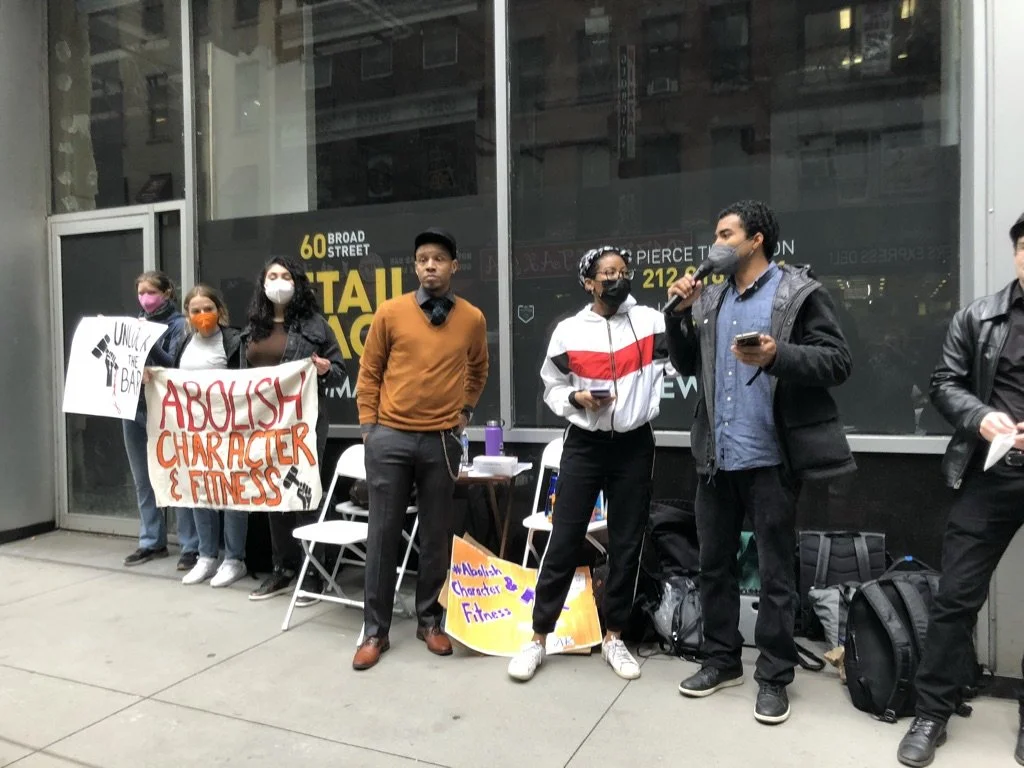Advocates call for reform to ‘exclusionary’ bar exam question
/More than a dozen advocates joined the rally outside of the Office of Court Administration’s offices in Manhattan to demand the review of Question 26 and the Character and Fitness exam on Wednesday, Feb. 23, 2022. Photo via UTB/Twitter
By Rachel Vick
A group of over a dozen New York City law school students and advocates capped off a week of action with a rally outside the Office of Court Administration to call for the removal of Bar admission practices that have been shown to disproportionately deter formerly incarcerated individuals and people of color.
Organizers with Unlock the Bar condemned question 26 of the state’s bar exam, which asks about an applicant's criminal history, and the exam’s character and fitness portion. The question has been criticized by advocates and Bar Association leaders alike. They say the practice is an antiquated remnant that upholds white supremacist ideals.
“We've heard absolutely nothing from [OCA], so today they're going to hear us,” said co-lead organizer Tolu Lawal. “Character and fitness is a white supremacist tool intended to maintain a white legal majority.”
“This is done with the intention… of making sure marginalized voices are sidelined and excluded,” Lawal added. “The intention is to make sure we never actually achieve liberation but oppressed people have overcome adversity way worse than character and fitness and we've come too far to let people hide behind character and fitness.”
In the United States, 86 percent of lawyers are white. Of the 1,386 federal judges, 1,112 are white, according to Lawal.
On Feb. 16, the group released a report on the history of the character and fitness portion of Bar admission, which found that the section was implemented by lawyers during a period when different identities and politics were beginning to claim their seats at the table.
The review of question 26, they said, should be only the next step in the fight for a more equitable legal profession.
Both the New York State and City Bar Associations have criticized the legality of the question, which asks applicants “Have you ever, either as an adult or a juvenile, been cited, ticketed, arrested, taken into custody, charged with, indicted, convicted or tried for, or pleaded guilty to, the commission of any felony or misdemeanor or the violation of any law, or been the subject of any juvenile delinquency or youthful offender proceeding?”
A report compiled by the NYSBA House of Delegates and released last month found that the question under review contributes to the exclusion of Black people, Indigenous people and people of color in the legal field and discourages entrants to law school.
“The question has had a chilling effect on potential lawyers - especially people of color – which flies in the face of much-needed efforts to improve diversity at all levels of the legal system,” said T. Andrew Brown, the NYSBA’s president. “We have heard from deans and directors of law school admissions that people of color who want to become lawyers are reluctant to invest the considerable time and money to attend law school because they worry that they could be rejected for admission to the bar due to a police interaction.”
Among the groups at the rally were New York University Law School students and a delegation from CUNY School of Law, several of whom with criminal histories said the the Long Island City institution was the only one that was willing to give them a chance — regardless of the Bar Admission hurdles they might face down the line.
Colby Williams, a 3L and former co-chair of the Formerly Incarcerated Law Students Advocacy Association, said that while applying for positions with firms or in other roles using his soon-to-be-J.D., many of his potential employers saw his inside experience with the criminal justice system as a benefit. He experienced the opposite with law schools.
FILSAA founder and current Legal Aid Society Queens lawyer Jerry Koch described the character review as traumatizing and alienating, and further stoked the passion for clearing pathways for formerly incarcerated people to participate in the law profession.
“Folks who know the law and can fight the law have been on the receiving end; these folks we most need... [are those] we consistently exclude,” Koch said. “One way or another we’re going to get those folks in [the Bar].”
Toward the end of the rally, UTB leaders attempted to deliver a petition with over 400 signatures to OCA, which was passed on to a court officer with the promise of delivery to OCA’s general counsel.
“This is a question that the Administrative Board of the Courts is aware of and it remains under discussion,” OCA Spokesperson Lucien Chalfen told the Eagle.
The Administrative Board of the Courts consists of Chief Judge Janet DiFiore, Chief Administrative Judge Lawrence Marks and Presiding Justices of the four Appellate Departments.




